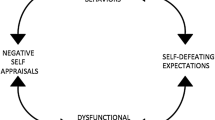Abstract
Emotion-focused therapy (EFT) is an empirically supported humanistic treatment that views emotion as fundamental to experience, as contributing to both adaptive and maladaptive functioning, and as essential to therapeutic change. EFT combines both following and guiding the client’s experiential process, emphasizing the importance of both relationship and intervention skills. Utilizing markers of particular emotional processing difficulties at the core of client problems, therapists intervene with matched interventions aimed to resolve the emotional processing difficulty. This process helps clients access new adaptive emotional resources, transform maladaptive emotional responses, address emotional interruption and regulation, make sense of experience, and construct new meaning and self-narrative.
Similar content being viewed by others
References
Damasio, A. R. (1994). Descartes’ error: Emotion, reason, and the human brain. New York, NY: G. P.Putnam.
Elliot, R., Watson, J. E., Goldman, R. N., & Greenberg, L. S. (2004). Learning Emotion-focused therapy: The Process–Experiential approach to change. Washington, DC, US: American Psychological Association.
Gendlin, E. (1996). Focusing oriented psychotherapy. New York: Guildford.
Greenberg, L. S. (2002). Emotion-focused therapy: Coaching clients to work through their feelings. Washington, DC, US: American Psychological Association.
Greenberg, L. S., & Johnson, S. M. (1988). Emotionally focused therapy for couples. New York, NY: Guildford.
Greenberg, L. S., & Paivio, S. C. (1997). Working with emotions in psychotherapy. New York, NY: Guilford Press.
Greenberg, L. S., & Watson, J. C. (2006). Emotion-focused therapy for depression. Washington, DC: American Psychological Association.
Greenberg, L. S., Rice, L. N., & Elliott, R. K. (1993). Facilitating emotional change: The moment-by-moment process. New York, NY, US: Guilford Press.
Greenberg, L. S., & Safran, J. D. (1987). Emotion in psychotherapy: Affect, cognition, and the process of change. New York, NY, US: Guilford Press.
Perls, F., Hefferline, R. F. & Goodman, P. (1951). Gestalt therapy. NY: Dell.
Rice, L. N. (1974). The evocative function of the therapist. In D. Wexler & L. N. Rice (Eds.). Innovations in client-centered therapy (pp. 289-311). New York: Wiley.
Rogers, C. R. (1951). Client-centered therapy: Its current practice, implications, and theory. Oxford, England: Houghton Mifflin., C.R. (1951).
Rogers, C. R. (1957). The necessary and sufficient conditions of therapeutic personality change. Journal of Consulting Psychology, 21, 95–103.
Samoilov, A., & Marvin, G. (2000). Role of emotion in cognitive-behavior therapy. Clinical Psychology: Science and Practice, 7(4), 373–385.
Teasdale, J. D. (1999). Emotional processing, three modes of mind and the prevention of relapse in depression. Behaviour Research and Therapy, 37(Supp 1), S53–S77.
Author information
Authors and Affiliations
Rights and permissions
About this article
Cite this article
Pos, A.E., Greenberg, L.S. Emotion-focused Therapy: The Transforming Power of Affect. J Contemp Psychother 37, 25–31 (2007). https://doi.org/10.1007/s10879-006-9031-z
Published:
Issue Date:
DOI: https://doi.org/10.1007/s10879-006-9031-z



